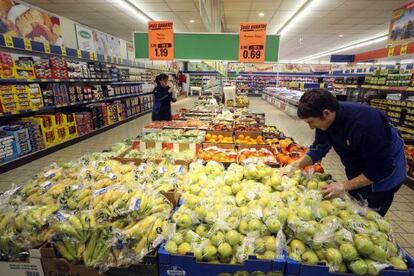Alcohol, razor blades and perfume: What tops the shoplifters’ wish list
Industry says organized gangs, not hungry individuals, are behind most supermarket thefts

Supermarkets and other food retailers lose an estimated combined €1.6 billion a year due to shoplifting, according to an industry group.
In a press conference, the business association AECOC announced its support for tougher new laws against theft in commercial establishments, and unveiled the products that get stolen the most: alcoholic beverages, razor blades and perfumes.
Ten percent of goods are stolen from the warehouse, another 10 percent from distribution platforms, and 10 percent during transportation
A study conducted by the consultancy EY on the association’s behalf shows that food shelves are often surreptitiously depleted of cold cuts, meats, fish, canned foods, chocolate products and sweets.
The most popular cosmetic products among shoplifters are razor blades and perfumes, while clothing and electronic equipment (tablets, videogames and cellphones) are popular targets as well.
In the hardware departments, thieves like to take away tools and batteries.
A full 71 percent of food retailers who participated in the study mentioned alcoholic drinks as one of the most popular items among shoplifters.
Another significant conclusion of the study is that 70 percent of items disappear from the stores, but the rest vanishes somewhere along the way between the producer and the display shelf.
Ten percent of goods are stolen from the warehouse, another 10 percent from distribution platforms, and 10 percent during transportation.
The study recommends improving logistics to prevent this percentage of pre-sales point theft.
Organized gangs, not starving folks
According to the analysis, “over 81 percent of companies reported that most shoplifting is carried out by organized gangs and professional thieves, confirming that the average shoplifter does not correspond to popular notions of “the poor starving thief.”
As for the motives, “88 percent of companies said most of the goods are resold in informal markets.”
The average value of the stolen goods ranges between less than €50 and €100, the respondents said.
Over half of participating companies said they report less than 15 percent of cases due chiefly to the uselessness of it given Spain’s lenient legislation. Some respondents also cited the long paperwork involved in filing a complaint.
Shoplifting will become a crime
While the study first came out in November, it came to the fore again this week because AECOC also expressed support for the new Penal Code about to go into effect in Spain. Under the new, tougher rules, larceny will become a crime, although if the value of the stolen items is under €400 it will be considered a minor crime. The industry association also supports new action against recidivists, who will face the possibility of prison after their fourth arrest.
José María Bonmatí, director general of AECOC, said he felt sure that these new regulations will act as a deterrent against shoplifters.
Ignacio García Magarzo, head of Asedas, another industry group, said that supermarket theft is “a problem with very low awareness in this country” because “stealing food products is considered quintessential to society.”
Tu suscripción se está usando en otro dispositivo
¿Quieres añadir otro usuario a tu suscripción?
Si continúas leyendo en este dispositivo, no se podrá leer en el otro.
FlechaTu suscripción se está usando en otro dispositivo y solo puedes acceder a EL PAÍS desde un dispositivo a la vez.
Si quieres compartir tu cuenta, cambia tu suscripción a la modalidad Premium, así podrás añadir otro usuario. Cada uno accederá con su propia cuenta de email, lo que os permitirá personalizar vuestra experiencia en EL PAÍS.
¿Tienes una suscripción de empresa? Accede aquí para contratar más cuentas.
En el caso de no saber quién está usando tu cuenta, te recomendamos cambiar tu contraseña aquí.
Si decides continuar compartiendo tu cuenta, este mensaje se mostrará en tu dispositivo y en el de la otra persona que está usando tu cuenta de forma indefinida, afectando a tu experiencia de lectura. Puedes consultar aquí los términos y condiciones de la suscripción digital.








































